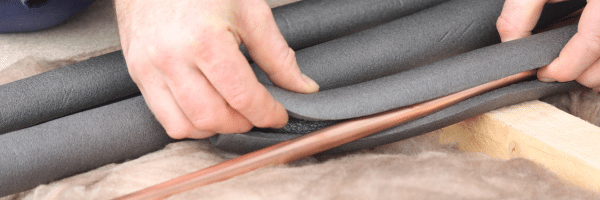
Winter can be hard on your home’s plumbing system. Cold temperatures increase the risk of frozen pipes, leaks, and other costly issues. Taking steps to winterize your plumbing will help you avoid these problems and ensure your home stays warm and safe all season long. Here are some practical plumbing tips for winter to protect your home for the harsh temperatures of winter.
1. Insulate Your Pipes
Exposed pipes in unheated areas like basements, crawl spaces, or garages are more likely to freeze when the temperature drops. Insulating these pipes is one of the most effective ways to prevent freezing. Foam pipe insulation is easy to install and helps keep your water flowing, even on the coldest days.
2. Let Faucets Drip
When temperatures fall below freezing, allow your faucets to drip slightly. Moving water is less likely to freeze, and keeping the water flowing can help relieve pressure in your pipes. This simple action can prevent pipes from freezing and bursting.
3. Seal Any Gaps or Cracks
Cold air can seep into your home through gaps and cracks around windows, doors, and in your foundation. These drafts can make your pipes more vulnerable to freezing. Sealing these gaps with weather stripping or caulk will help keep cold air out and protect your plumbing.
4. Disconnect Outdoor Hoses
Leaving garden hoses connected during the winter can cause water to freeze and expand in the hose and outdoor faucet, leading to damage. Disconnect all hoses and store them indoors. Be sure to shut off and drain any outdoor faucets to prevent freezing.
5. Keep Your Home Heated
Set your thermostat to at least 55°F, even when you’re away from home. This will help ensure that indoor pipes stay warm enough to avoid freezing. Make sure all areas with plumbing are heated, especially basements and garages.
6. Check Your Water Heater
Your water heater works harder during the winter months. Ensure it’s in good condition by scheduling a professional inspection. If your water heater is older, consider upgrading to a more energy-efficient model before the cold weather sets in.
7. Locate Your Main Water Shut-Off Valve
In case of a burst pipe or other plumbing emergency, you’ll need to act fast. Make sure you know where your home’s main water shut-off valve is located, and teach other members of your household how to use it. This can prevent severe water damage in the event of a plumbing issue.
At My Georgia Plumber, we’re here to help you get your home ready for winter. Our licensed plumbers can assist with everything from pipe insulation to water heater maintenance, ensuring your plumbing is fully prepared for the colder months. Don’t wait until it’s too late—contact us today to schedule your winter plumbing checkup or for more practical plumbing tips for winter.









